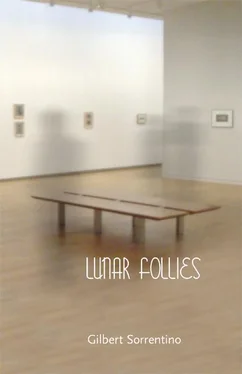High upon a wall, quite near the ceiling, a large thing, colored a strangely glowing puce, abuts a frosty moon. Splinters descend, splinters of ice, falling on other things below; below, that is to say, the frosty moon’s “mirror image” (although this notion has long been subject to critical attack, mostly labile in nature), the thunder moon. The latter moon leans against a lavender thing. Other vaguely organic elements crowd about, in the best possible way. Piled in an attractive heap down by the entrance to the pongee grouping, flanked, as tradition demands, by metallic pillars crafted in homage to Catharina Duchesse, the old Caliph’s favorite filly, are variously sized, smoldering examples of perfectly designed representations of a grass moon, egg moon, planting moon, milk moon, rose moon, flower moon, strawberry moon, hay moon, green corn moon, grain moon, fruit moon, hunger’s moon, and a beaver moon, disguised as a spruce moon, in honor of the Yuletide season. Above this gleaming jumble of dazzling color and sparkling surface hangs the always reliable harvest moon, which shines on, shines on. In a revealing photograph of the old Hotel Astor, things appear to have got somewhat out of hand. The hotel band, Tab Jazzetti and His Melodists, seems to be trying to “swing,” or so it would seem from close observation of the musicians’ divers postures. Their music stands mysteriously bear the initials OO, said initials being intertwined and dusted with mica so as to glitter like the frosty moon. It’s best when the sun strikes the whole dance floor, so they say, with a kind of rousing BANG, although incandescent lighting will do in a pinch, that is, on a dark day. Fluorescent lights, however, really mess things up rather badly. “Might as well not be here at all with the moons looking like that,” some have been overheard to say from the polished floor. And many of them were quite respectably dressed, and, it is rumored, know all the best restaurants. Wherein, sad to say, the fucking morons always order the wrong things.
The Odradek, the first one to be placed on public view in the United States in more than a century, has been, we are told in the helpful catalogue, prepared by Tobias Blumfeld for the Prague Zoological Society and Marching Band, “preserved … in what analysis shows to be a solution of equal parts hydrogen peroxide, lemon juice, and triple-distilled 160 proof Ukrainian vodka.” Discovered three years ago in a grotto in the Caucasus, the small creature has been seen, and marveled at, in museums the world over, before his arrival in this country earlier in the year. From here, the Odradek will travel back to what will be his permanent home in Azerbaijan’s National Wool Museum. Although the bits and pieces of thread, tangled together, as always, that are wound about the little creature are varied in color, as we have come to expect, these threads seem remarkably new; that is to say, one expects, somehow, the Odradek to display “raiment” that is as old as himself — and star-scholars agree that this particular specimen is between 800 and 1,100 years old. For the Odradek to flaunt threads newly manufactured when he was already centuries old diminishes the little being’s “presence,” of course. One hastens to add, however, that this diminishment is neither profound nor, finally, important. As a matter of fact, the colors of the threads (azure, rose, chartreuse, burnt orange, alabaster, pearl grey, butter, and lavender) are so striking as to constitute an authentic, enduring beauty as they flutter against the matte, off-black contours of the Odradek’s five-pointed body, and the dull mahogany of his crossbar with its cunningly attached rod. The little creature stands upright and utterly still on his wooden rod and one of his star points or “legs,” although it is apparently possible for him to heave himself onto his dorsal surface, despite the fact that no one has ever seen him do so; nor has anyone ever seen the little fellow resting in what may be thought of as a supine position. Viewers gaze long upon the Odradek, fascinated by his curious, modest charm. Most, when queried, admit that they are beginning to hear him speak; according to mountain legend, the Odradek’s lightest word is able to change his hearers’ lives forever.
Rejected Works: Otto Clavius Contemporaries
“Slightly Menacing Shadows,” Jeanne Souze; “Luminous White Dresses,” Emiliano Soreau; “The Snowman, His Tiny Eyes Glittering,” Isidor Martin; “A Wife, or Was She a Whore?” Donald Chainville; “Blue Enamel Bulb,” Ann Jenn; “Barely Moving On,” Russell Cuiper; “Cigarette Hysteria,” Emilia Sladky; “Lost Items of Clothing,” Bill Juillard; “Depraved Scenes of Village Life,” Leonard Bacon; “Amid a Cloud of White,” Ronald LeFlave; “The Holocaust of Books,” Edward Carmichael; “Refinements of the Baroque,” Stephen Alcott; “The Far Side of the Lake,” Isabella Stella; “Freak Cartoons,” Ivan Hounsfield; “The Blue Hamper,” Jonathan Tancred; “The Distinguished Publisher,” Ström Owns; “Fragments of Malarkey,” J. Branch Bex; “Evidence of Pain and Anger,” Ramp St. James; “Life-Sized Doll,” Harlow Warbucks; “Molten Blue Metal,” Jed Whag; “Tin Pig Behind the Door,” Frank Hector; “Cuisine Noire,” Cassandra Ballesteros; “Wading in the Shallows,” Sandor Skariofszky; “The Carnal Jitters,” Bridget Agostin; “Her Fiancé’s Mother and Two Older Sisters,” Sydelle Lelgach; “Translucent Spheroids,” Marcus Tommie; “Distant Female Figures in White,” Gregory Balbet; “The Maddening Cassandra,” Bart Ballesteros; “The Long Bitter Night Was a Snowy One,” Olga Chervonen; “The Delights of Housework,” Claudia Bedu; “Myrna Felt Like Undressing for the Conductor,” Yolanda Philippo; “The Meaning of the Past,” Claude Urbane; “Wife of an Adulterous Banker,” Claire Hounsfield; “The Storage of Gardening Equipment,” Moko; “The Great Sculptor,” Archibald Fuxer; “Closed Door of Thick Blue Steel,” Joshua Bex; “A Pathetic Attempt at Comedy,” Barbara Frietchie; “Two Spectral White Trees,” Robert Bedu; “Maddened, Quarreling, Screaming Crowd,” Claude Luxo; “Sweet Guilt,” Norman Bob; “Three Determined Strokes of Cadmium White,” John Cerjet; “World of Chips,” Sheldon Marius; “Glossy Black Chinese Teapot,” Caleb Bex; “Onrush of Twilight,” Solange McCarty; “Unwanted Reflections,” Hubert-Allen Zipp; “Jaded Desk Clerk,” Lafcadio Bob; “Bottle of Worcestershire Sauce,” Raoul; “The Brilliance of the Moon,” Luigi Borsalino; “The Murky Stage of His Recollections,” Corporal Hitler; “Clothed in Gleaming White,” Theodore Rosa-Rose; “Three Young Women of About Seventeen,” Alex Found; “A Flash of White,” Ursula Grüntéd; “A Panel of Christian Experts,” Senator Weep; “Navy Blue Melton Overcoat,” Emilie Bex; “Girl in the Cellar,” Rondee; “Helga, the Hermit Ghost,” Benno DeLux; “Too Good to Be True,” Gain Doyle; “Three Women in Newspaper Hats,” Ford Hills; “This Vast Desire,” Willis Took.
Open 24 Hours, Through December 18th, No Photos!
These are portraits and busts of Cleomedes, “Eddie C,” created from imagination, fantasy, sketchy and unsatisfactory biographies, and forged records, not to mention suspect memories and poorly written yet loathsomely reverent memoirs (which recall Céline’s dry remark, “every virtue has its contemptible literature”), and the anecdotes of friends and enemies, all of whom are rather sweatily trying, as they say, to look their best. So then, whatever his true visage, it will not be found here, that seems certain. More interesting, at least to some, is that in about the year 125, we are told, Cleomedes had the radical idea that the earth is round and that the moon, when full, is actually the face of a bloated, imbecilic, and acne-scarred God. His inability to explain the moon’s weird shapes in its other “phases” made him, or so a contemporary memoir suggests, a “figure of fun.” Cleomedes also worked as a creative consultant on such songs as “Carolina Moon,” “The Moon Is Blue,” “Moonlight Serenade,” “Moon River,” “On Moonlight Bay,” “Moon Love,” “Moonglow,” “Moon Over Miami,” “Moonlight Becomes You,” “The Moon of Manakoora,” “Alabama Song,” “Moonlight on the Ganges,” “Moonlight and Roses,” “The Moon Was Yellow,” “Moonlight in Vermont,” “Moonlight Cocktail,” “Blues My Naughty Sweetie Gives to Me,” “The Daughter of Rosie O’Grady,” and “Why Do They All Take the Night Boat to Albany?”. The smallest of eleven busts, hammered out of a matte-nickel alloy, shows him smiling somewhat sardonically, if not cruelly. Most neo-historicist theorists as well as critics of trenchant opinions agree that this unassuming piece is as close as we are likely to come to an accurate depiction of “Eddie C,” for it has been generally accepted that the figure shown is caught in the moment before singing, or, perhaps, chanting, “O moon of Alabama, we now must say goodbye.” At the very least, this essentially pedestrian exhibition allows the patient visitor a chance to appreciate the “home truths” and mending walls, so to speak, behind the bias of the structuralist radicalization of representational male iconography, no small feat, especially when it is realized that there is but one bathroom on the floor and that one “Out Of Order.”
Читать дальше












